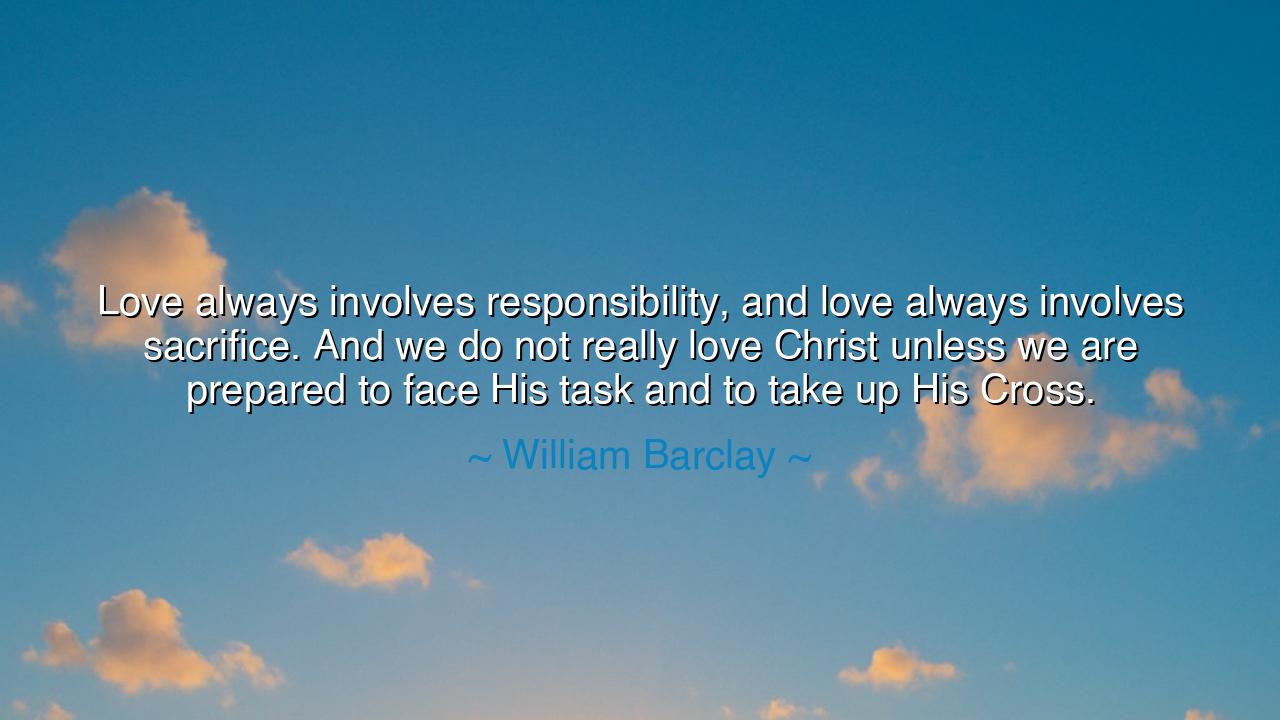
Love always involves responsibility, and love always involves
Love always involves responsibility, and love always involves sacrifice. And we do not really love Christ unless we are prepared to face His task and to take up His Cross.






The words of William Barclay — “Love always involves responsibility, and love always involves sacrifice. And we do not really love Christ unless we are prepared to face His task and to take up His Cross” — ring with the solemn music of eternal truth. In these few lines, Barclay reminds us that love is not sentiment, but service; not comfort, but commitment. It is the highest calling and the hardest path, one that demands both the heart’s tenderness and the spirit’s strength. His words echo through time like the voice of an ancient teacher speaking to weary disciples: if you would love truly, you must bear the weight of what that love requires.
To love responsibly is to stand firm when emotion fades, to act with care even when convenience tempts neglect. The ancients understood that love without duty is but a fleeting desire. A parent’s love must rise each morning to provide; a friend’s love must remain steadfast in another’s storm; and the love of one who follows Christ must take shape in deeds, not words. Barclay’s teaching pierces the illusion of easy faith. To love Christ is not merely to praise Him in comfort, but to join Him in suffering, to walk beside Him on the road to Calvary, carrying our share of the burden for the sake of others. For love that costs nothing is no love at all; it is a shadow without light, a word without weight.
This truth has been carved into the hearts of saints and martyrs throughout the centuries. Think of Mother Teresa, who took up her cross among the poorest of Calcutta. Her love was not an emotion stirred by pity, but a living flame born from sacrifice and responsibility. She rose before dawn each day, not for her own peace, but to serve the dying and the forgotten. She bore sickness, exhaustion, and misunderstanding, yet she never turned away. Her life was Barclay’s wisdom made flesh: she loved Christ by embracing His work — feeding, healing, consoling, and forgiving. Such love is not beautiful because it is painless; it is beautiful because it is faithful in pain.
Barclay’s reference to “taking up the Cross” recalls the words of Jesus Himself: “If anyone would come after me, let him deny himself and take up his cross daily, and follow me.” The Cross is not only a symbol of suffering; it is the mark of love perfected through endurance. To take it up is to say, “I will not flee when love becomes hard.” Every generation faces its own version of this Cross — a trial that tests the sincerity of the heart. For some, it is the care of an ailing parent; for others, the defense of truth in a world of lies; for still others, the quiet labor of kindness that goes unseen. In each case, the same truth endures: real love requires the will to endure, to give more than one receives, and to remain even when the world turns away.
In this sense, Barclay’s words are not only spiritual but universal. The responsibility of love extends beyond faith into every human bond. The soldier who defends his homeland, the teacher who lifts the next generation, the spouse who forgives again and again — all bear their crosses in the name of love. They prove that sacrifice is the language through which love speaks most clearly. The one who refuses that burden may taste pleasure, but never peace; the one who accepts it may suffer, but will know joy unshaken. For love and suffering are twins, and where one is absent, the other is incomplete.
Yet Barclay does not call us to despair under this weight, but to glory in it. For when we embrace responsibility and sacrifice, we do not lose ourselves — we become more fully alive. To take up the Cross is to discover meaning where comfort could not, and purpose where pleasure fades. In bearing another’s burden, we find strength we did not know we possessed; in giving of ourselves, we discover that love multiplies, not diminishes. Thus, the Cross becomes not only a symbol of suffering, but of transformation — the moment when love transcends the self and touches the divine.
The lesson of Barclay’s quote is as urgent today as it was in the time of Christ: do not seek a love that costs you nothing. Whether in faith, family, or friendship, let your love be responsible and sacrificial — a love that gives, that forgives, that endures. Take up your own cross, however small it may seem, and carry it with courage. For in every act of selfless love, the heart of Christ beats anew in the world.
So remember this, children of light: to love truly is to serve; to serve is to sacrifice; and to sacrifice is to share in the divine mystery of redemption. Do not flee from the weight of your love — bear it, and in bearing it, you will rise. For as Barclay teaches, love that embraces the Cross is not the end of life’s joy, but its truest beginning.






AAdministratorAdministrator
Welcome, honored guests. Please leave a comment, we will respond soon